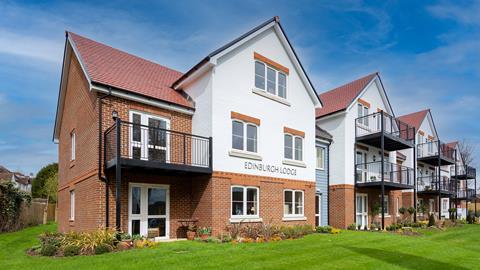Retirement housebuilder blames materials and labour increases plus building regs changes for margin fall
Retirement housebuilder Churchill has seen its pre-tax profit fall despite rapid growth in sales, as it was hit by changes to building regulations and build cost increases.
Privately-owned Churchill Retirement Living Plc reported pre-tax profit for the year to June 2022 of £34.6m, down 11%, in its audited annual accounts. Turnover leapt by 25% to £200m. This was itself a significant increase on the £91m reported in the previous covid-affected 2019/21 year.

Writing in the report, chairman and chief executive Spencer McCarthy hailed a year of “progress”, and blamed the falling profit on an “an 8% increase in build costs driven by raw material and wage inflation, and by the implementation of new building regulations.”
He added that the cost of investment in growth in the business – which took on nearly 100 staff in the year and opened several new regions – plus the inability to secure income from freehold interests due to government policy decisions, also impacted upon margins. The firm’s pre-tax margin declined from 24.3% to 17.3%, but McCarthy nevertheless claimed its operating margin “continues to be the strongest in the retirement housing industry”.
The results were achieved from the sale of 513 homes – a 31% increase on the previous year. McCarthy said the results put the business on track to achieve the “key objectives” for the business as laid out in 2021, which include increasing the business to 1,000 unit sales per year at a market leading margin, and achieving a countrywide presence for the business.
McCarthy said the business plans to invest £800m in new sites in the “coming years” and had just opened new offices in Bristol and Warrington to support recent expansion into the North and Wales.
>>See also: Removing the barriers to later living development
>>See also: Later living sector backs A Fair Deal for Housing
McCarthy, who co-founded the business with his brother Clinton in 1994 and is son of McCarthy & Stone founder John McCarthy, said the growth was being achieved despite “significant challenges” in the planning system which had pushed the average time taken to get a consent to 16 months.
The report said that the combination of under-resourced planning departments and the nutrient neutrality challenge had combined to “present the most challenging planning environment we have experienced for many years.”

McCarthy added that despite signing up to the government cladding pledge, Churchill had assessed its past developments and found that it had built no buildings suffering from cladding or life-critical fire safety defects.
McCarthy said firms such as his should therefore be exempt from the proposed £3bn Building Safety Levy, which Michael Gove has suggested will be levied on all planning permissions above a certain size.
“It is my strong belief that our company should not be obliged to pay the new Building Safety Levy which the Government is seeking to implement, firstly as we do not build developments with cladding, secondly since, unlike the vast majority of major housebuilders, we do not receive any taxpayer support through the government’s “Help To Buy” scheme, and thirdly since we are already obliged to pay the new Residential Property Developer Tax for the remediation of buildings constructed by other developers”, he said.











No comments yet